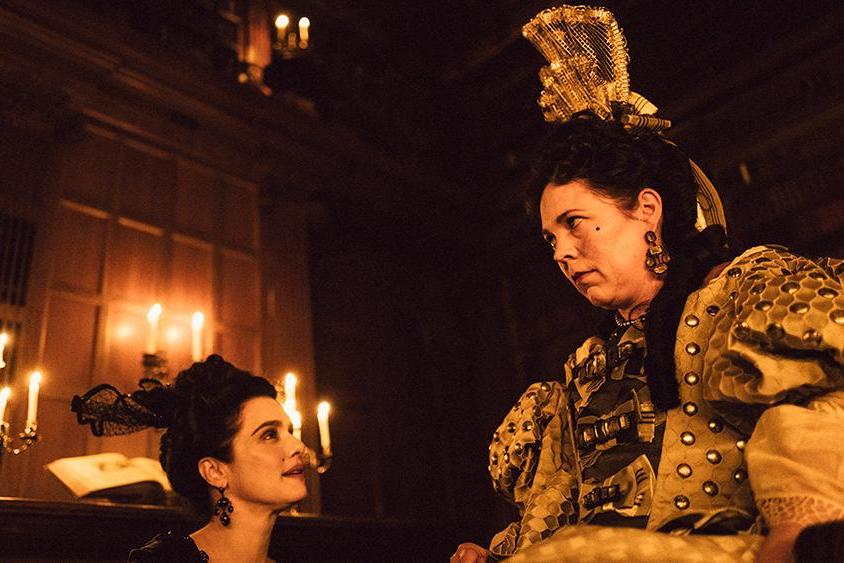The new class of lesbian genre films like 'The Favourite' means we are no longer just portrayed as bad or mad
What is very exciting about so many lesbian genre films being around is that we can afford to be selective rather than semi-reluctantly going along to see the lesbian film because, unlike buses, another may not come along for some time


Your support helps us to tell the story
From reproductive rights to climate change to Big Tech, The Independent is on the ground when the story is developing. Whether it's investigating the financials of Elon Musk's pro-Trump PAC or producing our latest documentary, 'The A Word', which shines a light on the American women fighting for reproductive rights, we know how important it is to parse out the facts from the messaging.
At such a critical moment in US history, we need reporters on the ground. Your donation allows us to keep sending journalists to speak to both sides of the story.
The Independent is trusted by Americans across the entire political spectrum. And unlike many other quality news outlets, we choose not to lock Americans out of our reporting and analysis with paywalls. We believe quality journalism should be available to everyone, paid for by those who can afford it.
Your support makes all the difference.Lesbians who came out in the 1970s did so in a cultural wasteland. It was not until formidable tennis champion Martina Navratilova came out in 1981 that we had someone to look up to.
The only lesbian-themed movies around at that time depicted us as tragic, or freaks, and often both. Personal Best, about two female athletes that fall for each other, and Desert Hearts set in Nevada, depicting yet another tragic love affair between women, were the least bad. Until the release of The Kids Are Alright, a film about children growing up with two mums who decide to seek out their sperm donor, I had never watched a general release film in which the main characters just happened to be lesbians, as opposed to the film being about (shock, horror) lesbianism and its associated problems and pitfalls.
Then, last year, the rather brilliant film about Billie Jean King, Battle of the Sexes, came out and gave me a couple of hours of total pleasure. Here was a feminist who fought tooth and nail on behalf of female tennis players in a sexist, male-dominated world, who embarks on a passionate love affair with another woman who she clearly prefers to her husband. The combination of badass feminism and intoxicating lezzerism spoke to me far louder than heartbreak or rejection.
The Miseducation of Cameron Post came out this summer, and was a hugely important film. Set in 1993 USA, the film tackled the horrendous practice of Christian “gay conversion therapy”, a heinous process in which young lesbians and gays are taken to a bootcamp type place where they are coerced into “praying away the gay”.
This year, there was Disobedience, based on Naomi Alderman’s novel of the same name, which is more about the bleakness of living a life dictated by fundamentalist religion. The depiction of orthodox Judaism and women’s roles is told through the lens of female same-sex attraction and conflicting cultures.
There are a few more films lined up for next year that are lesbian themed, but appear to be fully rounded storylines with a purpose beyond the “Oh! Look! Lesbians!”
Vita and Virginia, a true story based on the relationship between 1920s free spirits Vita Sackville-West and Virginia Woolf is a must for fans of the Bloomsbury Group.
The Favourite is a historical period drama starring Olivia Colman. The story is based on the behind-the-scenes politics between two cousins jockeying to be court favourites during the reign of Queen Anne in the early 18th century.
Tell It to the Bees is a British comedy based on a novel by Fiona Shaw. The storyline is a lesbian romance that flourishes in a Scottish village in the 1950s. Not necessarily my scene, but it will appeal to others I am sure. What is very exciting about so many lesbian genre films being around is that we can afford to be selective rather than semi-reluctantly going along to see the lesbian film because, unlike buses, another may not come along for some time.
I can’t wait to see Rafiki, which is scheduled for general release next April. Rafiki, which premiered in Cannes this year, is about lesbians in Kenya, East Africa, and as is often the case, is based on two women falling in love with each other. Rafiki was banned by the Kenya Film Classification Board “due to its homosexual theme and clear intent to promote lesbianism in Kenya contrary to the law”. Film is a great tool in any liberation struggle, and can serve to educate and politicise as well as entertain.
I now feel much better able to critically assess a lesbian-themed film, and not worry about slagging off one of them in case it appears disloyal or ungrateful. The more films that depict us means the less sensitive we will be about being portrayed in one or two as mad or bad, such as The Killing of Sister George and Notes on a Scandal.
Why are we so spoilt for choice at present? Is there a reason why so many varied depictions of lesbian lives and issues are headed for the big screen? My own view is that the growth of the lesbian genre is a reflection of how sick and tired we are of being either misrepresented or invisible. Either way, it’s all good.
Join our commenting forum
Join thought-provoking conversations, follow other Independent readers and see their replies
Comments